Related Research Articles

Papua New Guinea, officially the Independent State of Papua New Guinea, is a country in Oceania that comprises the eastern half of the island of New Guinea and its offshore islands in Melanesia. It shares its only land border with Indonesia to the west and its other close neighbors are Australia to the south and the Solomon Islands to the east. Its capital, located on its southern coast, is Port Moresby. The country is the world's third largest island country, with an area of 462,840 km2 (178,700 sq mi).

The economy of Papua New Guinea (PNG) is largely underdeveloped with the vast majority of the population living below the poverty line. However, according to the Asian Development Bank its GDP is expected to grow 3.4% in 2022 and 4.6% in 2023. It is dominated by the agricultural, forestry, and fishing sector and the minerals and energy extraction sector. The agricultural, forestry, and fishing sector accounts for most of the labour force of PNG while the minerals and energy extraction sector, including gold, copper, oil and natural gas is responsible for most of the export earnings.

Port Moresby, also referred to as Pom City or simply Moresby, is the capital and largest city of Papua New Guinea. It is one of the largest cities in the southwestern Pacific outside of Australia and New Zealand. It is located on the shores of the Gulf of Papua, on the south-western coast of the Papuan Peninsula of the island of New Guinea. The city emerged as a trade centre in the second half of the 19th century. During World War II, it was a prime objective for conquest by the Imperial Japanese forces during 1942–43 as a staging point and air base to cut off Australia from Southeast Asia and the Americas.

Bougainville, officially the Autonomous Region of Bougainville, is an autonomous region in Papua New Guinea. The largest island is Bougainville Island, while the region also includes Buka Island and a number of outlying islands and atolls. The current capital is Buka, situated on Buka Island.
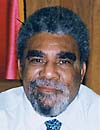
Sir Mekere Morauta was a Papua New Guinean politician and economist who served as the 7th Prime Minister of Papua New Guinea from 1999 to 2002. Inheriting a depressed economy and a fractious legislature, he embarked on fundamental reforms of the country's economy and political system.

Religion in Papua New Guinea is dominated by various branches of Christianity, with traditional animism and ancestor worship often occurring less openly as another layer underneath or more openly side by side with Christianity. The Catholic Church has a plurality of the population. The courts, government, and general society uphold a constitutional right to freedom of speech, thought, and beliefs. A secular state, there is no state religion in the country, although the government openly partners with several Christian groups to provide services, and churches participate in local government bodies.

The Ok Tedi Mine is an open-pit copper and gold mine in Papua New Guinea located near the headwaters of the Ok Tedi River, in the Star Mountains Rural LLG of the North Fly District of the Western Province of Papua New Guinea.
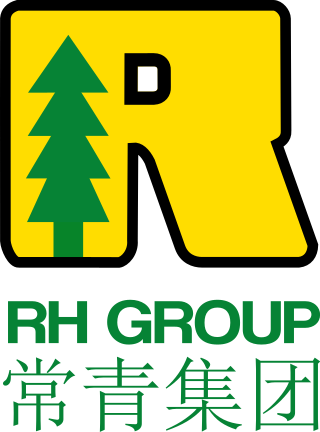
Rimbunan Hijau is a Malaysian multinational logging corporation controlled by Malaysian businessman Tiong Hiew King. The company has operations in many countries, including Malaysia, Indonesia, Papua New Guinea, Equatorial Guinea, Gabon, Vanuatu, New Zealand and Russia.

Papua New Guinea together with the West Papua region of Indonesia make up a major tropical wilderness area that still contains 5% of the original and untouched tropical high-biodiversity terrestrial ecosystems. PNG in itself contains over 5% of the world's biodiversity in less than 1% of the world's total land area. The flora of New Guinea is unique because it has two sources of origin; the Gondwana flora from the south and flora with Asian origin from the west. As a result, New Guinea shares major family and genera with Australia and the East Asia, but is rich in local endemic species. The endemicity is a result of mountainous isolation, topographic and soil habitat heterogeneity, high forest disturbance rates and abundant aseasonal rainfall year round. PNG boasts some 15–21,000 higher plants, 3,000 species of orchids, 800 species of coral, 600 species of fish, 250 species of mammals and 760 species of birds and 8 species of tree-kangaroos out of which 84 genera of animals are endemic. Ecosystems range from lowland forests to montane forests, alpine flora down to coastal areas which contains some of the most extensive pristine mangrove areas in the world. Much of this biodiversity has remained intact for thousands of years because the ruggedness of the terrain made the interior lands inaccessible; furthermore low population density and restrictions on the effectiveness of traditional tools, ensured that these biodiversity was never overexploited.
Papua New Guinea has exported liquefied natural gas (LNG) since 2014. The LNG sector is important to PNG's economy with US$2.95 billion in exports in 2020, and accounting for 5.25% of the GDP in 2019. On a global scale, PNG is a minor player, with 0.08% of world reserves In 2020, PNG was ranked 16th on the list of gas exporting countries.
Copra plantations in New Guinea have been cultivated since the late 19th century, originally by German colonialists. They were continued by Australian interests following World War I.
This article addresses various criticisms of Cargill Inc, a privately held agribusiness multinational giant with operations in 70 countries and its headquarters in Minneapolis, Minnesota, in the United States. Cargill Inc has been owned by the Cargill family for 154 years. It is the largest privately-owned corporation in the United States, with an annual revenue of $113.5 billion in 2019.

Coffee production in Papua New Guinea is the country's second largest agricultural export, after oil palm, and employs approximately 2.5 million people. It accounts for approximately 1% of world production, according to the United Nations Conference on Trade and Development (UNCTAD).

Deforestation in Papua New Guinea has been extensive and in recent decades from 2001 to 2020, Papua New Guinea (PNG) lost 1.57Mha of tree cover, equivalent to a 3.7% decrease in tree cover since 2000, and 1.15Gt of CO₂e emissions.
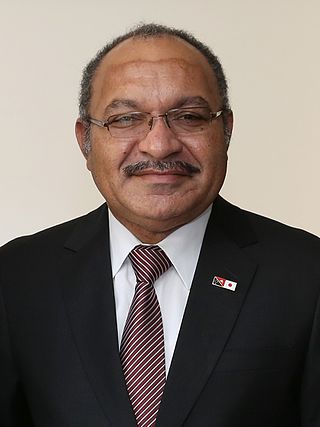
Peter Charles Paire O'Neill is a Papua New Guinean politician who served as the seventh Prime Minister of Papua New Guinea from 2011 to 2019. He has been a Member of Parliament for Ialibu-Pangia since 2002. He was a former cabinet minister and the leader of the People's National Congress between 2006 and 2022. He resigned his position as prime minister to avoid a vote of no confidence, and he was succeeded by James Marape.

Corruption is rife in Papua New Guinea (PNG). According to The Economist, "PNG's governments are notorious for corruption, and ever run the risk of turning the state into a fully-fledged kleptocracy".

The Development Policy Centre (Devpol) is an aid and development policy think tank based at the Crawford School of Public Policy in the College of Asia and the Pacific at the Australian National University. Devpol undertakes independent research and promotes practical initiatives to improve the effectiveness of Australian aid, to support the development of Papua New Guinea and the Pacific Islands region, and to contribute to better global development policy.
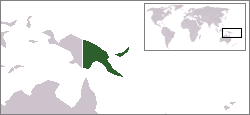
The crime rate of Papua New Guinea is one of the highest in the world.
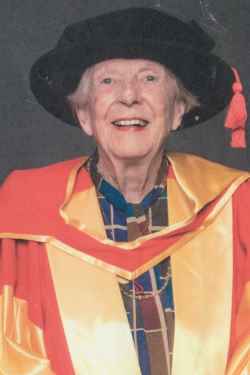
Ellen Maev O'Collins, MBE was an Australian social worker by training, who became Emeritus Professor in the Department of Anthropology and Sociology at the University of Papua New Guinea.
Matilda Pilacapio is a human rights activist and an environmental rights activist from Papua New Guinea (PNG). A former member of the provincial government of Milne Bay Province, she is particularly known for her campaigns against the oil palm industry. More recently she has been active in the Papua Hahine Social Action Forum, a group campaigning against gender-based violence.
References
- 1 2 "Rosa Koian". The Pacific Community. Retrieved 2018-07-28.
- ↑ Koian, Rosa. "Women in patrilineal and matrilineal societies in Melanesia" (PDF). Retrieved 28 July 2018.
- ↑ "Rosa Koian-Resource Wars | Moana Nui Action Alliance". mnaa-ca.org. Retrieved 2018-07-28.
- ↑ Wilton, Jen. "Papua New Guinea: the new frontier for palm oil production : : Contributoria - people supporting journalism". www.contributoria.com. Retrieved 2018-07-28.
- ↑ "Scourge of leprosy, a disease of the poor, returns to PNG - Keith Jackson & Friends: PNG ATTITUDE". asopa.typepad.com. Retrieved 2018-07-28.
- ↑ "Leprosy was thought to be eliminated in Papua New Guinea – but it's back". The Royal Australian College of General Practitioners News. Retrieved 2024-08-29.
- ↑ "On Our Land Film: Press Kit". oaklandinstitute.org. Retrieved 2018-07-28.
- ↑ "Papua New Guinea: Logging giants dodge tax, social responsibilities". Green Left Weekly. 2016-09-06. Retrieved 2018-07-28.
- ↑ "Breaking Barriers in Papua New Guinea: Rosa Koian". World Bank. Retrieved 2024-08-29.
- ↑ "Social and Economic Impact of Climate Change in Papua New Guinea, Rosa Koian. C42.1, 2012. - Melanesian Institute Shop". shop.mi.org.pg. Retrieved 2018-07-28.
- ↑ Koian, Rosa (2012). "Social and economic impact of climate change in Papua New Guinea". Catalyst. 42 (1).